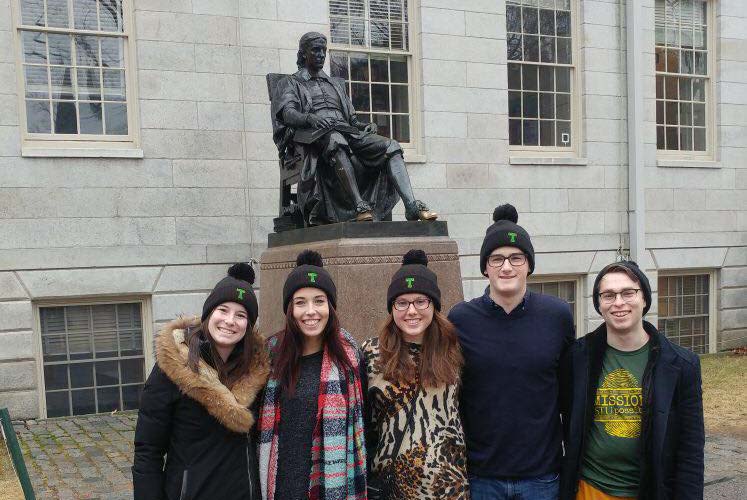St. Thomas University students joined more than 3,000 delegates from around the world at the 64th Harvard National Model United Nations conference on March 6.
Philippe Ferland, Emilie Hanlon, Rachel Slipp, Jarrod Ryan and Rachelle Patrick represented Iran on various committees throughout the three-day simulation. The participants worked with fellow delegates to pass resolutions on several global issues, including decreasing dependence on Middle Eastern oil and the Syrian refugee crisis.
Ferland is pursuing a master’s degree in international relations next year. His longtime interest in diplomacy and doing Model UN in high school prompted him to get involved.
Ferland said it was challenging to balance Iran’s toxic relationship with other nations in the simulation.
“It’s a very intense work experience, but it’s also kind of enjoyable too,” Ferland said. “When you come to understand how it functions, it’s something you feel like you can get really into.”
Patrick said she decided to take the course to increase her public speaking skills and described learning about Iran as an “eye-opening” experience.
“While their human rights situation isn’t ideal, their country is beautiful and a lot of people don’t understand that unfortunately,” she said.
Slipp acted as a delegate for the Commission on the Status of Women during the simulation.
“As a human rights student and a feminist, it was difficult researching and representing a country where women’s rights are extremely restricted, but I learned a lot about how to craft creative arguments that respected the country’s policy,” she said.
Slipp said while the committee consisted primarily of women, the few men in the room said they learned a lot about women’s rights following the passing of the resolution.
“Fighting for gender equality can be exhausting at times, but the people in this committee really inspired me by sharing their perspectives from what’s happening in their countries and showing me that there are plenty of people doing this work across the globe,” she said.
Students from over 70 nations travelled to Boston to attend the conference at Harvard University, and had ample opportunities to get to know one another.
Ferland said it was interesting learning from Venezuelan students about their investment and interest in learning diplomacy, in hopes of addressing some of the challenges their country is experiencing.
Patrick said she was fascinated by perspectives on the Syrian refugee crisis from European students, who are close to the situation and have a firsthand understanding.
STU has sent students to the Harvard model UN for over 20 years.
Students in the St. Thomas Model UN class spent the first few months of the semester-long course learning about constructing position papers, the general procedures of a simulation and delivering policy speeches. They received their country and committee assignments in November.
The course contains a substantial amount of independent and hands-on learning.
Patrick said the class taught her to learn in a different way and she recommends the course to anyone with an interest in global issues.
“The conference itself is about where 70 per cent of your learning happens,” she said. “Everything goes so fast and you have to pick up your feet.”
Slipp said despite a semester of preparation, nothing could fully prepare her for what the simulation would be like until the first committee session.
“Throughout this whirlwind weekend, you really learn how to collaborate with others, because if you didn’t speak up on behalf of your country’s interests, they wouldn’t be included in debate or in the proposed resolutions,” she said.
Ferland said he enjoyed participating in the interactive, experience-based learning opportunity.
“I like school and I like studying, but to get the chance to put it into practice is just that much better.”

